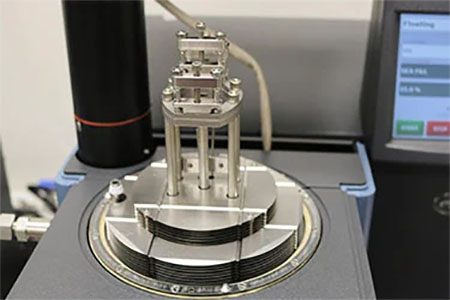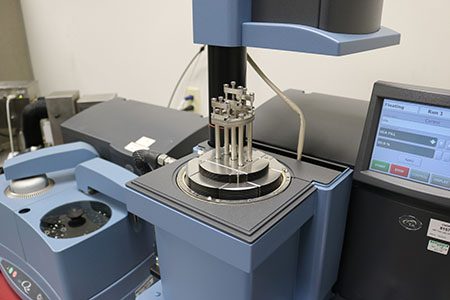Dynamic Mechanical Analysis
Dynamic Mechanical Analysis (DMA) is a powerful tool for characterizing the physical-mechanical properties of non-metallic materials. Extensively utilized in several application areas, DMA test procedures are used to measure the mechanical and thermal behavior of solids, liquids, and polymers. The DMA test offers insight into modulus, damping, and viscoelasticity parameters.
Many researchers also utilize DMA testing protocols to understand fracture behavior under sustained loading conditions. This provides a unique insight into material failure trends that cannot be obtained through other testing techniques. DMA tests provide essential information about the functionality and performance of materials across multiple industries.
DMA Testing Methods
- Glass Transition (Tg) Temperature and Secondary Transition Measurements
- Orientation Determinations Caused by Processing
- Cold Crystallization Testing
- Properties of Filler Effects in Composites
- Creep Testing
- Stress Relaxation Testing
- Transient Testing
- Dynamic Oscillatory Testing
- Stress/Strain Testing
- Phase Difference Testing
- Material Stiffness Testing
For more information on IMR's DMA capabilities, click here to request a quote, or click on the button below.
DMA TESTING STANDARDS
- ASTM D5023: Dynamic Mechanical Properties: In Flexure
- ASTM D5024: Dynamic Mechanical Properties: In Compression
- ASTM D5026: Dynamic Mechanical Properties: In Tension
- ASTM D7028: Glass Transition Measurement of Polymer Matrix Composites
- ASTM E1640: Glass Transition Measurement of Polymers
- ASTM E1867: Temperature Calibration of Dynamic Mechanical Analyzers
HOW DMA TESTING IS PERFORMED
A sample is clamped in the measurement head of the DMA instrument. During measurement, sinusoidal force is applied to the sample via the probe. Deformation caused by the sinusoidal force is detected, and the relation between the deformation and the applied force is measured.
The non-contact linear drive technology of the DMA provides precise stress control and air bearings for low friction support.
IMR has become a leader in testing, measuring, and analyzing the mechanical properties of non-metallic materials as a function of time, temperature, and frequency. Temperature can remain constant while observing frequency and vice versa. Some studies analyze a combined relationship between temperature and frequency while samples are tested against various constants
DYNAMIC MECHANICAL ANALYZER
The process of dynamic mechanical analysis can be done with control of the stress force or strain displacement.
Strain Control
With strain control, the response time is short for specific materials, and the measurements are made with relative ease.
Stress Control
The process of dynamic mechanical analysis can be done with control of either the stress force or strain displacement, torsionally, axially. Use of these controls all provide individual test results.
Torsional or Axial
Torsional force is applied to liquids and some solids, and axial force is applied to solids. Researchers can gain insight into torsional and axial stresses and deformations, which are critical in understanding materials’ overall strength during real-world applications.




MECHANICAL TESTING METHODS
Abrasion (Taber)
Bend Testing
Bond Strength Testing
Charpy Impact Testing (-320°F to 450°F)
Climbing Drum Adhesion of Sandwich Composites
Coating Adhesion
Coating Shear Fatigue
Coefficient of Thermal Expansion by TMA
Composite Testing (Fiber Reinforced)
Compression Set
Compressive Properties
Core Shear Properties of Sandwich Construction by Beam Flexure
Creep and Stress Rupture Testing
DMA (Dynamic Mechanical Analyzer)
Ductility
Elastic Modulus
Fatigue Testing
Filled Hole Tension & Compression
Flattening
Flat-wise Tensile Testing
Flexural Properties
Floating Roller Peel Strength
Fracture Mechanics
Gel Time
Hardness (Rockwell, Brinell, Durometer, Shore, Barcol, Knoop, Vickers, Macro Vickers)
Heat Aging
Heat Deflection by TMA
Heat Treatment (furnace to 2100°F)
Hydrogen Embrittlement
Hydrostatic Pressure
Indentation Toughness
Interlaminar Shear
Jominy Hardenability
Lap Shear Testing
Machining & Specimen Preparation
Materialography
Modulus of Rupture (MOR)
n-Value (Strain Hardening Exponent)
Open Hole Tension and Compression
Pipeline Integrity Testing
r-Value (Plastic Strain Ratio)
Residual Strength of Composites After Impact
Rotating Beam Fatigue
Shear Testing of Rivets to ASTM B565, Single/Double
Short Beam Strength
Shot Peen Qualification
Single-Edged Notched beams (SENB)
Slow Strain Rate (G129)
Specimen Conditioning
Strain Gaging
Surface Roughness (ANSI/ASME B46.1)
T Peel Strength
Tear Resistance of Films & Sheeting
Tear - Rubbers & Elastomers
Tensile Testing
Torsional and Axial Fatigue (200 lb)
Tube Testing (Tensile, Flare, Hydrostatic)
Welder & Procedure Qualification
Wire/Spring Testing (Wrap, Coil, Bend)
Young's, Tangent and Chord Modulus (Room Temperature)
DYNAMIC MECHANICAL ANALYSIS FAQ'S
IMR can perform DMA testing within a few days of receiving a test sample, and expedited options are available.
DMA is a thermal test that indicates a material's force, stress, strain, frequency, and temperature.
RELEVANT ACCREDITATIONS
Click here for a complete list of accreditations and certifications for all IMR Test Labs locations.


